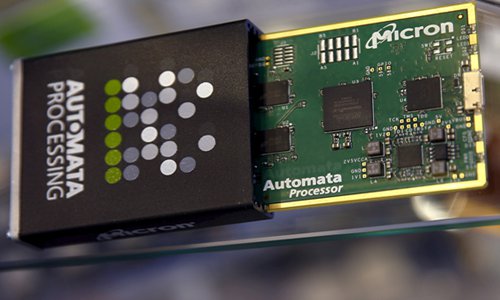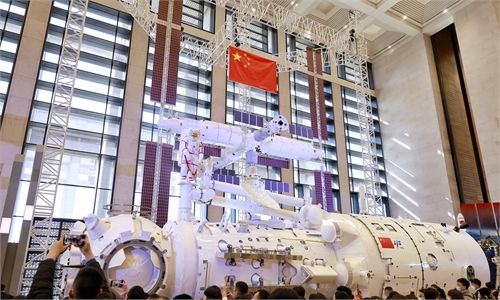
Memory chip parts by Micron Technology are pictured at an industrial fair in Frankfurt in 2015. File photo: VCG
Science and technology independence has been a major focus for deputies and members during the two sessions, with proposals and suggestions from the representatives reflecting China's strengthened determination to achieve self-reliance and tackling bottlenecks in technology advancement.
Feng Dan, a professor from Huazhong University of Science and Technology and a deputy to the 14th National People's Congress (NPC), said on Sunday that she has witnessed and participated in the development of China's storage technology and related products from the earliest days, adding that the nation will win the future only through constantly ramping on technology innovations.
Deputies and members including Tang Changhong, a member of the Chinese People's Political Consultative Conference (CPPCC), submitted a proposal on "optimizing the market access mechanism and accelerating the development of unmanned aviation systemic industry", proposing to give full play to the nation's inherent advantages so as to enhance the country's international competitiveness in unmanned technology.
China has established a solid foundation in the unmanned technology sector, which meets the strategic needs of the nation's growth of new industries, Tang, who is also an academician from the Chinese Academy of Engineering, told the Global Times.
China is leading the world in the research and development of unmanned aerial vehicles (UAVs), as China's sales in this sector have accounted for more than 70 percent of global market share, making it one of the major producers and exporters of UAV, Shu Zhenjie, deputy chief engineer of Avic China Aero-Polytechnology Establishment, told the Global Times.
Feng served as a head of an expert group for the study and research of the major project targeting mass storage through the nation's "863 Program"-- a national high-tech R&D program, which breaks monopoly of foreign countries on high-end storage systems.
Feng noted that the achievement helped the leap of China's storage industry from technology dependence to independent innovation, and the domestic market share of homegrown storage systems has surged to current 60 percent from less than 5 percent years ago.
However, the nation is still facing multiple challenges in certain technology spheres.
For instance, China's unmanned intelligence industry is dealing with obstacles such as its nascent industrial application while the necessary industry infrastructure, mechanisms, and targeted standards and regulation still require further improvement. And, the nation's development in memory microchips that are critical to storage systems remain a weak link, Feng said.
Moving forward, deputies and members have come up with detailed proposals which highlight the need for strengthened efforts to resolve industry wide bottlenecks.
The proposal by aviation industry deputies and members pointed out that the expansion of more application scenarios and system construction are two key directions for the future work, in a bid to accelerate the development of the industry, enhance Chinese firms' competitiveness, and create a Chinese paradigm for the development of strategic emerging industries.
Feng said that her research team has jointly established a laboratory with a number of leading Chinese enterprises to develop the next-generation memory chips with faster speed and lower energy consumption.
The Government Work Report delivered to NPC stressed that scientific and technological policies should aim at building up China's strength and self-reliance in science and technology throughout 2023.

